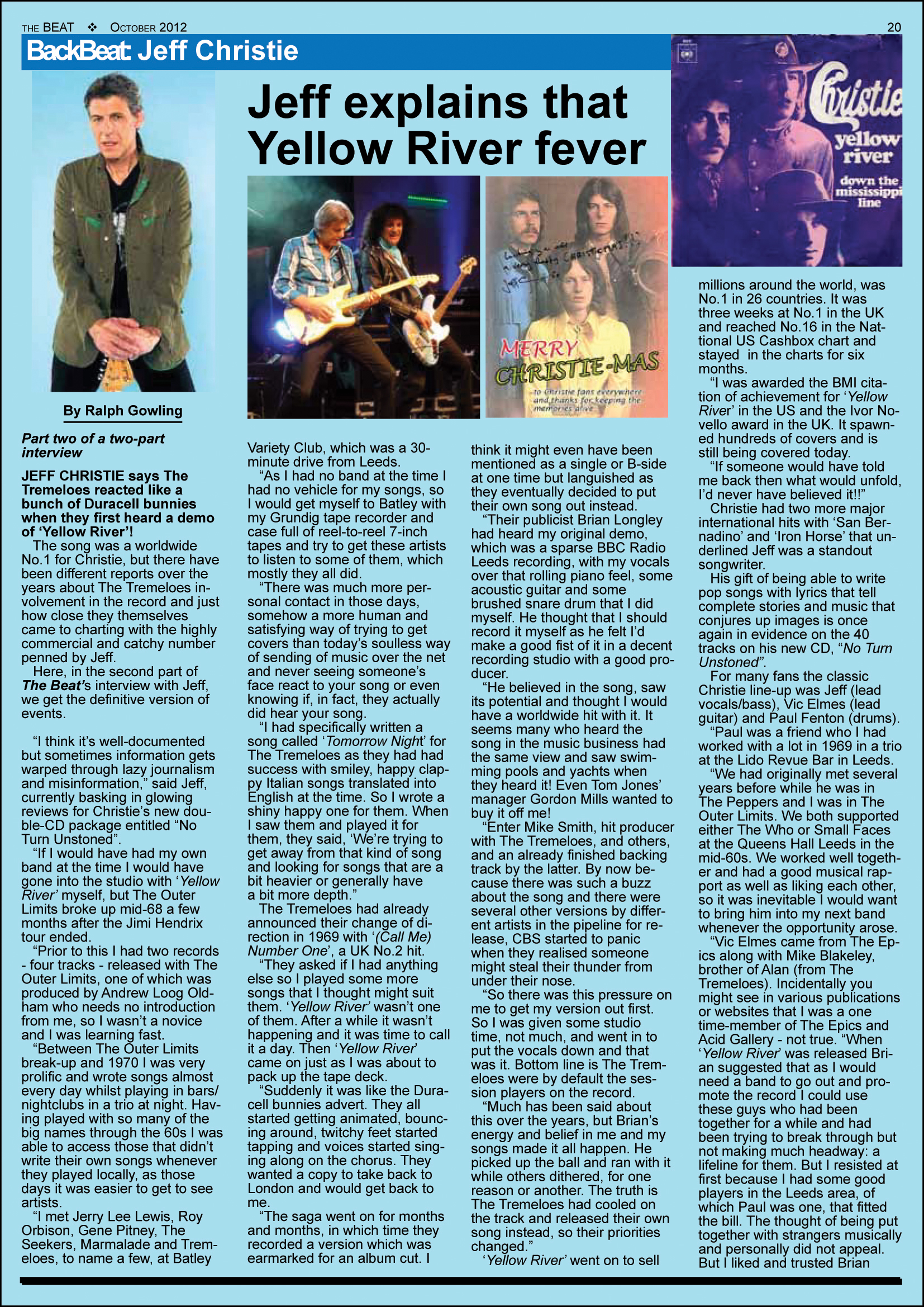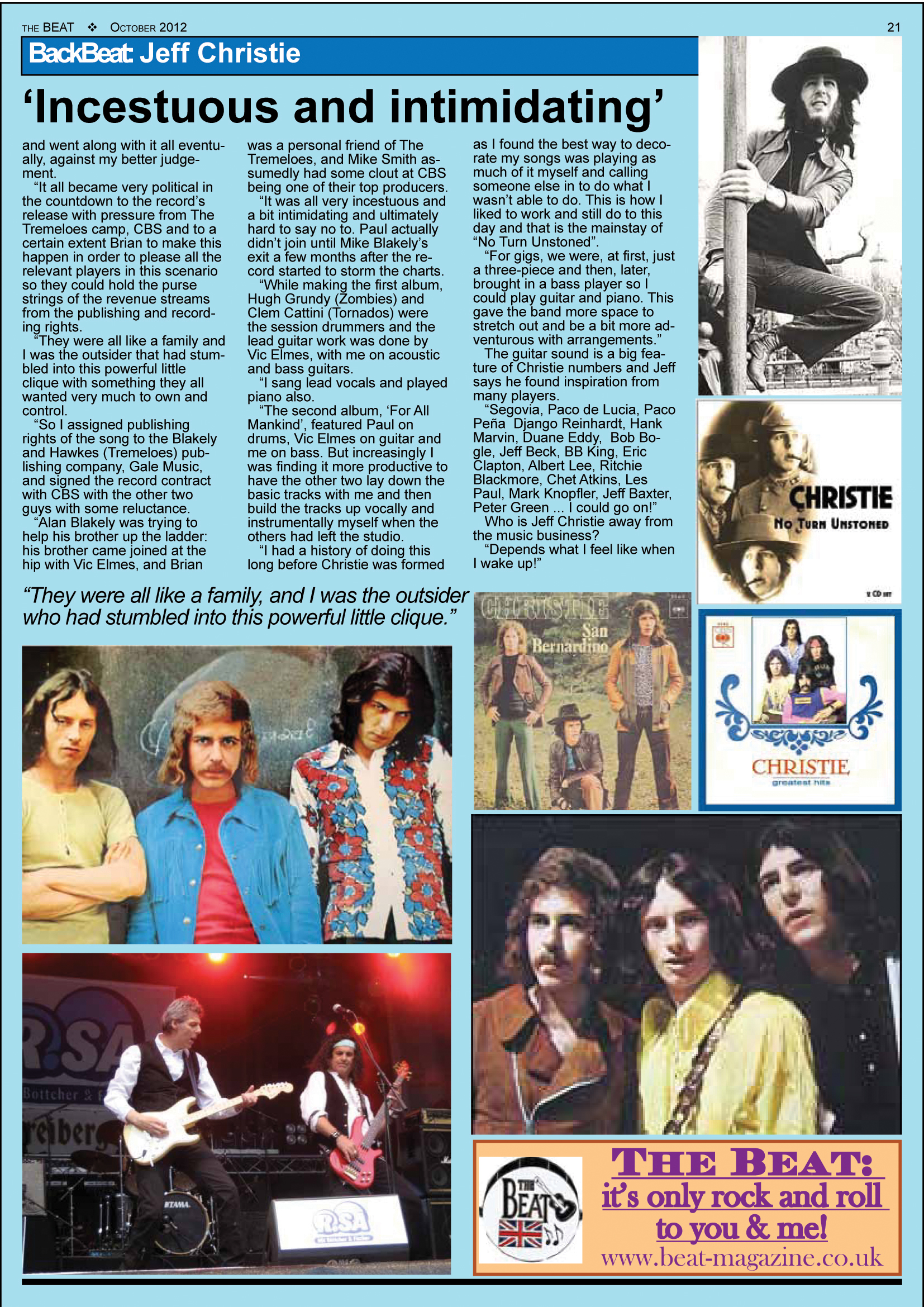Here's Pt 2
of an interview Jeff did with Ralph Gowling, editor of the
UK publication Beat Magazine, which appeared in October
2012.

JEFF
Christie says The Tremeloes reacted like a bunch of Duracell
bunnies when they first heard a demo of Yellow
River!
The
song was a worldwide No.1 for Christie, but there have been
different reports over the years about The Tremeloes' involvement
in the record and just how close they themselves came to
charting with the highly commercial and catchy number penned
by Jeff.
Here, in the second part of The Beat's
interview with Jeff, we get the definitive version of events.
"I think it's well-documented but
sometimes information gets warped through lazy journalism
and misinformation," said Jeff, currently basking in
glowing reviews for Christie's new double- CD package entitled
No Turn Unstoned.
"If I would have had my own band
at the time I would have gone into the studio with Yellow
River myself, but The Outer Limits broke up mid-68
a few months after the Jimi Hendrix tour ended.
"Prior to this I had two records
- four tracks - released with The Outer Limits, one of which
was produced by Andrew Loog Oldham who needs no introduction
from me, so I wasn't a novice and I was learning fast.
"Between The Outer Limits break-up
and 1970 I was very prolific and wrote songs almost every
day whilst playing in bars/ nightclubs in a trio at night.
Having played with so many of the big names through the
60s, I was able to access those that didn't write their
own songs whenever they played locally, as those days it
was easier to get to see artists.
"I met Jerry Lee Lewis, Roy Orbison,
Gene Pitney, The Seekers, Marmalade and Tremeloes, to name
a few, at Batley Variety Club, which was a 30- minute drive
from Leeds.
"As I had no band at the time I had
no vehicle for my songs, so I would get myself to Batley
with my Grundig tape recorder and case full of reel-to-reel
7-inch tapes and try to get these artists to listen to some
of them, which mostly they all did.
"There was much more personal contact
in those days, somehow a more human and satisfying way of
trying to get covers than today's soulless way of sending
of music over the net and never seeing someone's face react
to your song or even knowing if, in fact, they actually
did hear your song.
"I had specifically written a song
called Tomorrow Night for The
Tremeloes as they had had success with smiley, happy clappy
Italian songs translated into English at the time. So I
wrote a shiny happy one for them. When I saw them and played
it for them, they said, 'We're trying to get away from that
kind of song and looking for songs that are a bit heavier
or generally have a bit more depth".
The Tremeloes had already announced their
change of direction in 1969 with (Call
Me) Number One, a UK No.2 hit.
"They asked if I had anything else
so I played some more songs that I thought might suit them.
Yellow River wasn't one of
them. After a while it wasn't happening and it was time
to call it a day. Then Yellow River
came on just as I was about to pack up the tape deck,"
Jeff said.
"Suddenly it was like the Duracell
bunnies advert. They all started getting animated, bouncing
around, twitchy feet started tapping and voices started
singing along on the chorus. They wanted a copy to take
back to London and would get back to me.
"The saga went on for months and
months, in which time they recorded a version which was
earmarked for an album cut. I think it might even have been
mentioned as a single or B-side at one time but languished
as they eventually decided to put their own song out instead.
"Their publicist Brian Longley had
heard my original demo, which was a sparse BBC Radio Leeds
recording, with my vocals over that rolling piano feel,
some acoustic guitar and some brushed snare drum that I
did myself. He thought that I should record it myself as
he felt I'd make a good fist of it in a decent recording
studio with a good producer.
"He believed in the song, saw its
potential and thought I would have a worldwide hit with
it. It seems many who heard the song in the music business
had the same view and saw swimming pools and yachts when
they heard it! Even Tom Jones' manager Gordon Mills wanted
to buy it off me!
"Enter Mike Smith, hit producer with
The Tremeloes, and others, and an already finished backing
track by the latter. By now because there was such a buzz
about the song and there were several other versions by
different artists in the pipeline for release, CBS started
to panic when they realised someone might steal their thunder
from under their nose.
"So there was this pressure on me
to get my version out first. So I was given some studio
time, not much, and went in to put the vocals down and that
was it. Bottom line is The Tremeloes were by default the
session players on the record.
"Much has been said about this over
the years, but Brian's energy and belief in me and my songs
made it all happen. He picked up the ball and ran with it
while others dithered, for one reason or another. The truth
is The Tremeloes had cooled on the track and released their
own song instead, so their priorities changed."
Yellow River went
on to sell millions around the world, was No.1 in 26 countries.
It was three weeks at No.1 in the UK and reached No.16 in
the National US Cashbox chart and stayed in the charts for
six months.
"I was awarded the BMI citation of
achievement for Yellow River
in the US and the Ivor Novello award in the UK. It spawned
hundreds of covers and is still being covered today.
"If someone would have told me back
then what would unfold, I'd never have believed it!!"
Christie had two more major international
hits with San Bernadino and
Iron Horse that underlined
Jeff was a standout songwriter.
His gift of being able to write pop songs
with lyrics that tell complete stories and music that conjures
up images is once again in evidence on the 40 tracks on
his new CD, No Turn Unstoned.
For many fans the classic Christie line-up
was Jeff (lead vocals/bass), Vic Elmes (lead guitar) and
Paul Fenton (drums).
"Paul was a friend who I had worked
with a lot in 1969 in a trio at the Lido Revue Bar in Leeds,"
Jeff said..
"We had originally met several years
before while he was in The Peppers and I was in The Outer
Limits. We both supported either The Who or Small Faces
at the Queens Hall Leeds in the mid-60s. We worked well
together and had a good musical rapport as well as liking
each other, so it was inevitable I would want to bring him
into my next band whenever the opportunity arose.
"Vic Elmes came from The Epics along
with Mike Blakeley, brother of Alan (from The Tremeloes).
Incidentally you might see in various publications or websites
that I was a one time-member of The Epics and Acid Gallery
- not true.

"When Yellow
River was released Brian suggested that as I would
need a band to go out and promote the record I could use
these guys who had been together for a while and had been
trying to break through but not making much headway: a lifeline
for them. But I resisted at first because I had some good
players in the Leeds area, of which Paul was one, that fitted
the bill. The thought of being put together with strangers
musically and personally did not appeal. But I liked and
trusted Brian and went along with it all eventually, against
my better judgement.
"It all became very political in
the countdown to the record's release with pressure from
The Tremeloes camp, CBS and to a certain extent Brian to
make this happen in order to please all the relevant players
in this scenario so they could hold the purse strings of
the revenue streams from the publishing and recording rights.
"They were all like a family and
I was the outsider that had stumbled into this powerful
little clique with something they all wanted very much to
own and control.
"So I assigned publishing rights
of the song to the Blakely and Hawkes (Tremeloes) publishing
company, Gale Music, and signed the record contract with
CBS with the other two guys with some reluctance.
"Alan Blakely was trying to help
his brother up the ladder: his brother came joined at the
hip with Vic Elmes, and Brian was a personal friend of The
Tremeloes, and Mike Smith assumedly had some clout at CBS,
being one of their top producers.
"It was all very incestuous and a
bit intimidating and ultimately hard to say no to. Paul
actually didn't join until Mike Blakely's exit a few months
after the record started to storm the charts.
"While making the first album, Hugh
Grundy (Zombies) and Clem Cattini (Tornados) were the session
drummers and the lead guitar work was done by Vic Elmes,
with me on acoustic and bass guitars. I sang lead vocals
and played piano also.
"The second album, For
All Mankind, featured Paul on drums, Vic on guitar
and me on bass. But increasingly I was finding it more productive
to have the other two lay down the basic tracks with me
and then build the tracks up vocally and instrumentally
myself when the others had left the studio.
"I had a history of doing this long
before Christie was formed as I found the best way to decorate
my songs was playing as much of it myself and calling someone
else in to do what I wasn't able to do. This is how I liked
to work and still do to this day and that is the mainstay
of No Turn Unstoned.
"For gigs, we were, at first, just
a three-piece and then, later, brought in a bass player
so I could play guitar and piano. This gave the band more
space to stretch out and be a bit more adventurous with
arrangements."
The guitar sound is a big feature of Christie
numbers and Jeff says he found inspiration from many players.
"Segovia, Paco de Lucia, Paco Peña
Django Reinhardt, Hank Marvin, Duane Eddy, Bob Bogle, Jeff
Beck, BB King, Eric Clapton, Albert Lee, Ritchie Blackmore,
Chet Atkins, Les Paul, Mark Knopfler, Jeff Baxter, Peter
Green ... I could go on!" he said.
Who is Jeff Christie away from the music
business?
"Depends what I feel like when I
wake up!"
 Part 1
Part 1

